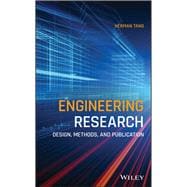Master the fundamentals of planning, preparing, conducting, and presenting engineering research with this one-stop resource
Engineering Research: Design, Methods, and Publication delivers a concise but comprehensive guide on how to properly conceive and execute research projects within an engineering field. Accomplished professional and author Herman Tang covers the foundational and advanced topics necessary to understand engineering research, from conceiving an idea to disseminating the results of the project.
Organized in the same order as the most common sequence of activities for an engineering research project, the book is split into three parts and nine chapters. The book begins with a section focused on proposal development and literature review, followed by a description of data and methods that explores quantitative and qualitative experiments and analysis, and ends with a section on project presentation and preparation of scholarly publication.
Engineering Research offers readers the opportunity to understand the methodology of the entire process of engineering research in the real word. The author focuses on executable process and principle-guided exercise as opposed to abstract theory. Readers will learn about:
- An overview of scientific research in engineering, including foundational and fundamental concepts like types of research and considerations of research validity
- How to develop research proposals and how to search and review the scientific literature
- How to collect data and select a research method for their quantitative or qualitative experiment and analysis
- How to prepare, present, and submit their research to audiences and scholarly papers and publications
Perfect for advanced undergraduate and engineering students taking research methods courses, Engineering Research also belongs on the bookshelves of engineering and technical professionals who wish to brush up on their knowledge about planning, preparing, conducting, and presenting their own scientific research.






